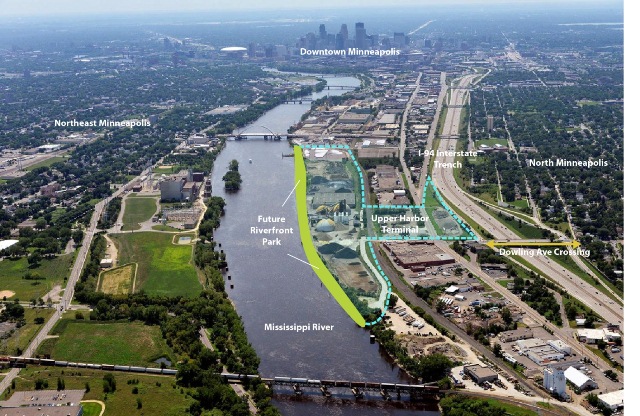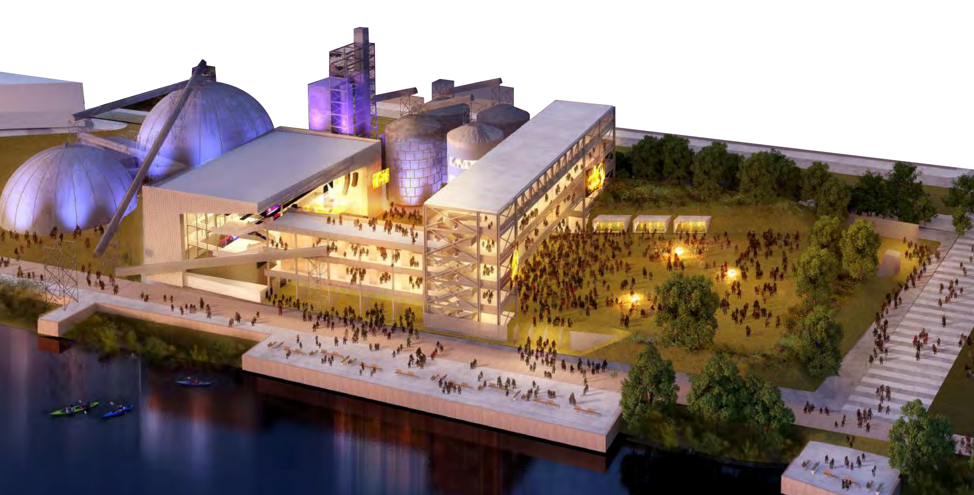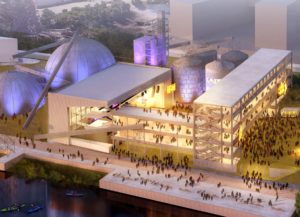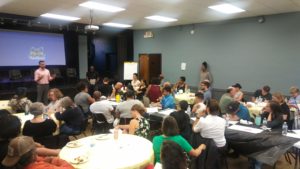
Greetings North Minneapolis Residents and Stakeholders,
Pillsbury United Communities, Public Policy Project-Environmental Justice Coordinating Council and McKnight Foundation (PUC-UHT Team) is presently following the orders and recommendation by Minnesota Governor Tim Walz and the MN Department of Health intended to limit the spread of the Coronavirus (COVID-19). Therefore, we will not be hosting our monthly Upper Harbor Terminal Development Learning Tables Community meetings until further notice. Our first priority is for the health and wellness of our people.
We also thank you for considering of yourself and others by following the social distancing guidelines from the Centers for Disease Control (CDC). We appreciate all of our Northside healthcare providers, grocery stores, sanitation workers, postal workers and all other essential staff who put themselves in danger to help us get through this.
When a crisis like this comes, it amplifies all the historical and current manifestations of environmental and economic injustice. These are the very patterns we have sought to discern how to address through our Learning Tables on the Upper Harbor Terminal development.
It is our understanding that the City of Minneapolis, Collaborative Planning Committee (CPC), the Developers (United Properties and First Avenue) and Minneapolis Parks & Recreation have canceled all planning meetings for the Upper Harbor Terminal Development. For more information about what the city is planning to do please contact Erik Hanson at CPED. http://upperharbormpls.com/.
At some point this will come to an end and we will go back to life as we knew it before the Pandemic. When that happens, we will begin again doing our UHT Learning Table meetings. Until then we would like to hear from you about our Learning Table Community Engagement process for the UHT Development.
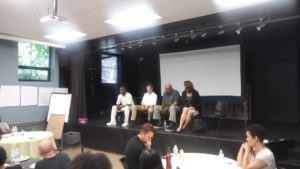 |
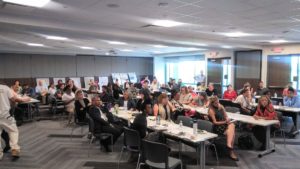 |
Note from the CEO
The Upper Harbor Terminal is a unique site with the ability to be an incredible community asset. As friends of mine have said, it is way past time to have this type of major investment in North Minneapolis. This is a people-centered project that connects us with job opportunities and provides new access to the Mississippi River, with new parkland and green space. It is also creating a new community fund that will generate ongoing, sustainable funding for the Northside from events at the outdoor music venue. People have more power than they realize, and we’re using that power to make Upper Harbor Terminal is a great project for North Minneapolis. Community engagement is ongoing, and I hope everyone with an interest in the Northside’s future will join in to help make the Upper Harbor Terminal project a resounding success.
James Trice
Founder/CEO, Public Policy Project
Co-Creator of Environmental Justice Coordinating Council (EJCC)
Public Policy Project
Upper Harbor Terminal Community Engagement Phase Two-Collective Designing 101
Public Policy Project is the Community Engagement Development Team Advisor on the community outreach strategy for the Upper Harbor Terminal Project. Over the course of 2019 – 2020, and through the COVID-19 pandemic, we have worked with our “core team” to facilitate 14 Learning Table events that have included as many as 120 community residents.
As we begin phase two of our Upper Harbor Terminal Development Community Engagement work, we will work with United Properties (Developer) in its efforts to engage with community residents and stakeholders for their input on designing what will be developed in phase 1 of the development. We call this phase of our community engagement – Collective Designing 101.
As part of our community engagement process, we will:
Coordinate and facilitate community engagement workshops that bring a community perspective to the Phase 1 project design and program. These meetings will be led by the Development team, with facilitation by PPP (4 meetings: June, July, August, Sept)
Facilitate Public Policy Project’s Learning Tables to connect developers, the city, focus group participants, and advisory council to the broader community. The Development Team will be an active participant. (2-4 meetings)
Identify, meet with, and prepare stakeholders for the 3 primary focus groups. Facilitate 3 content-specific focus groups and one additional focus group for representatives from each focus group to compare perspectives and join recommendations. Do follow-up summaries and notes on the discussion. The focus groups topics to include:
- Economic Inclusion Strategies (4 meetings)
- Environmental Justice & Sustainability (4 meetings)
- Health & Wellness Hub – Plan, Program, and Partners (2 meetings)
CBA Term Sheet:
Review and provide input on the proposed contract terms and language for the Community Benefits Agreement term sheet (submitted to City Council in late September). Terms will include content that is learned from the Focus Groups, Learning Tables, as well as PPP perspective on other items that are important to the community.
Public Policy Project – 2021 UHT Community Engagement Phase Two Collective Designing – From Vision to Action Video
Community Engagement Learning Table Video Trailer.
What do we mean by community ownership at the Upper Harbor Terminal?
● Decision making power
● Freedom, wealth building & sharing
● Building trust; purpose, healing, pride
● Voice has influence, legal control, seen as complete, an asset & powerful
● It is accessible, and beneficial to residents of all ages
● The community directs the whole process from vision and planning to implementation.
Economic benefits directly accrue to community
● Ability for community member to adapt to a place over time to best meet their needs and desires
● Financial stakes, decision making power on financial/organizational aspects & structure
● Community working together, equality, clear understanding, park land
● Worker cooperatives are community ownership
● Public spaces, self serving spaces, plazas, farmer’s market, co-ops
● Land that is not commodified and sold to a private developer – the land is managed by the collective for the collective good
● Worker owned co-ops, non-profit, profits being directly invested
● Community members join finances & buy property to give to the community
● Transparency- Authority members communicate to public and make all records public
● Community, land, trust
● Assets controlled & owned by a rep/mechanism allowing community to influence their operation or use & enjoy benefits
● Providing opportunities for communities to benefit from an establishment by way of services or space or building wealth
● Keeping wealth within the community, contributing to decisions, contractors & staff also community members
● Youth & students from the area have access to jobs & opportunity on site
● Business in the neighborhood have first chance at space or development
● Having a shared interest in a project with community ownership and control with respect to decision making
● Jacob’s article on Green New Deal for public housing
● Shared financial interest, ability to stay in area, ability to find a home, feeling a sense of belonging, youth and student resources
● The community decides what happens, the communitie’s best interest is reflected in the planning, development, others can’t take it away
● A sense of belonging, staying power,finding a home
● Race equality lens, members have opportunity to make financial contribution to own a part of the development and have legal authority, wealth creation
● Democratic ownership, cooperative gardens, eco-job manufacturing, public arts, cooperative housing
● Specifically make opportunities for ownership available to those who have been marginalized and denied wealth building opportunities in the past.
● Process active hemp programs
● The city has an already signed exclusive rights agreement with a private developer and then have community ownership
● Individuals that relate to each other by ethnicity, age, culture, geography and share some commonality and have some control over economics social mores, politics & goverance
More information on the Development
Community Benefits
Infrastructure/Land Use
Matrix
Upper Harbor Terminal
McKnight has provided a grant to Pillsbury United Communities (PUC) working with Environmental Justice coordinating Council (EJCC) in order to support a working partnership between community organizations, the development team, the City and MPRB to help promote a common vision for UHT that benefits the community. PUC was selected because of the organization’s longstanding commitment to North Minneapolis communities, its working relationships with the City and community organizations, and the institutional infrastructure and project management staff expertise. PUC and partners are working with the Environmental Justice Coordinating Council (EJCC), the City, MPRB the development team, McKnight and others to identify important stakeholders to include in the process. McKnight’s intent is not to support a specific position or development proposal, but rather to support the long-term planning, visioning, and relationship building that is necessary to foster more community benefits emerging from development at UHT, and potentially future development throughout North Minneapolis communities.
The Upper Harbor Terminal (UHT) development provides a once-in-a-generation opportunity to create a large-scale, community-building asset in North Minneapolis. The Mississippi River in Minneapolis and much of the North side riverfront has not been designed to provide community benefit and instead has been managed for transporting bulk commodities. Yet even the vision of a port for commodity transportation never came to fruition, and for the first time in decades, the closing of the Upper St. Anthony Lock allows for creative and community-focused development to take place.
Additionally, beyond the immediate opportunity presented by UHT, community leaders recognize a need to disrupt traditional development patterns. North Minneapolis has historically been overburdened with extractive development, often not owned or intended to benefit local residents. Community stakeholders often feel that their priorities get lost in the process of attracting developers and capital to a project. UHT provides a test case to explore new ways of incorporating community participation and community ownership. An integral precursor to having successful community-based development is honest, constructive dialogue between key stakeholders, including City officials, the development team, and community leaders. Trusting relationships between these entities is key to developing momentum for community-benefitting UHT development.
Stay up to date
Get on our email list

